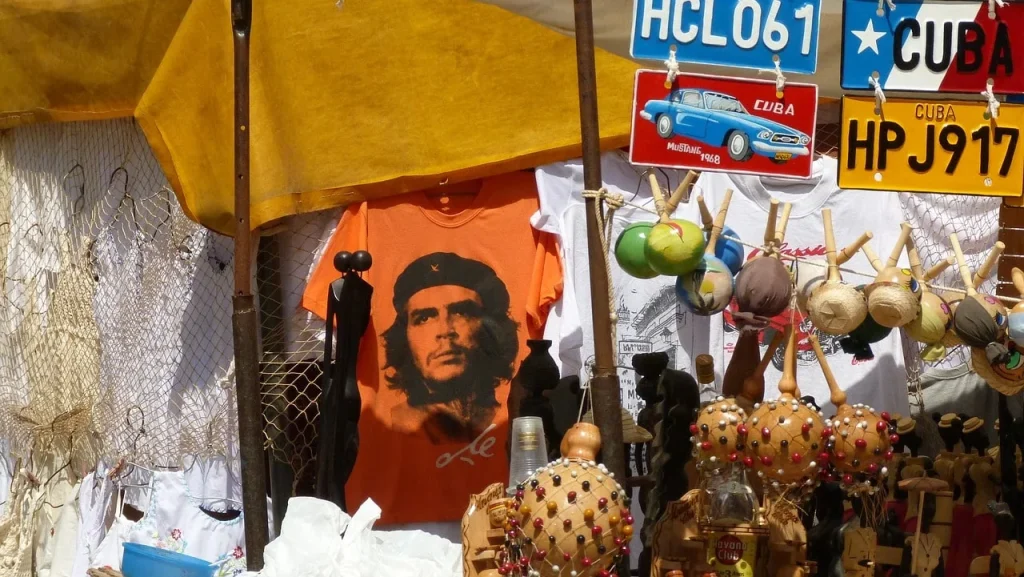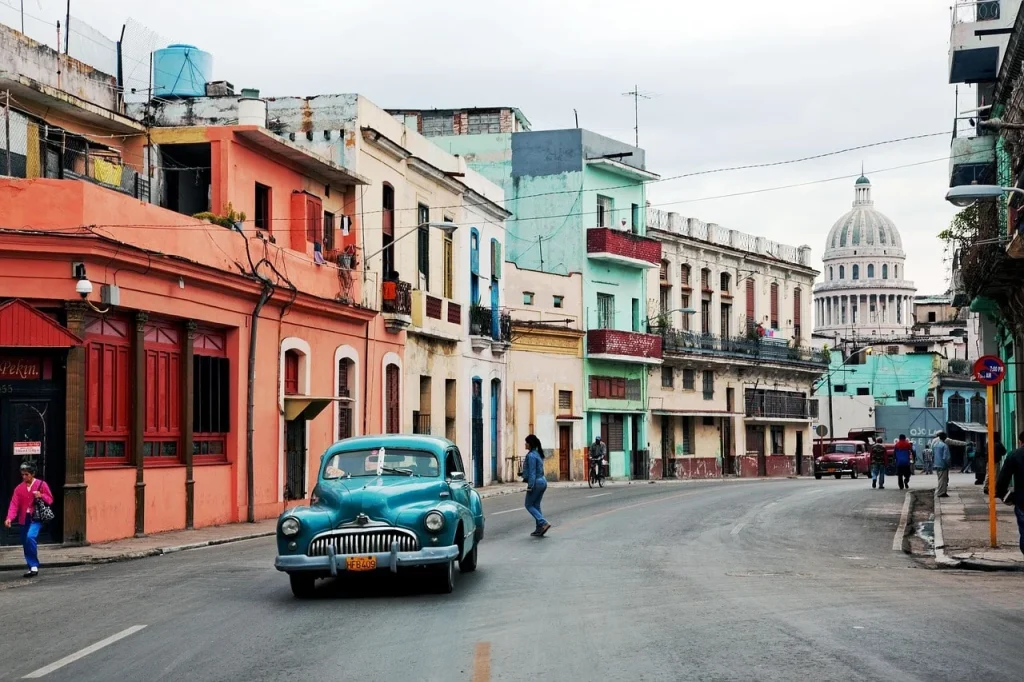Cuba, a country of sun-drenched beaches, rolling mountains, and sugarcane fields, is as rich in history as it is in beauty. But there’s so much more to this Caribbean island than meets the eye.
Beyond the classic cars and salsa rhythms lies a land of remarkable diversity and resilience. In our list of some interesting facts about Cuba, we’ll explore everything from its revolutionary past to its innovative healthcare system, not forgetting the vibrant traditions that pulse through its streets.
Join us as we uncover the many layers that make Cuba an unforgettable place to learn about. Are you ready?
I am Fidel Castro and we have come to liberate Cuba.
Fidel Castro
Cuba Facts
Before we dive into the vibrant and complex world of Cuba, remember that there’s a quiz waiting at the end of this article. Read through the facts carefully to prove you’re an expert on this topic.
- This nation is home to the smallest bird in the world, the bee hummingbird, measuring approximately 2 inches in length.
- The traditional Cuban dish, ropa vieja, translates to “old clothes” in English, reflecting its shredded beef appearance.
- In the early 20th century, it became the first country in Latin America to install a railroad.
- The famed novelist Ernest Hemingway wrote The Old Man and the Sea while living here, inspired by its local fishing community.
- The national flower is the white mariposa, symbolizing rebellion and independence from Spanish rule.
- A peculiar law from the 1950s made it illegal to play or listen to The Beatles, considering their music a symbol of ideological diversionism.
- It holds one of the world’s highest doctor-to-patient ratios, emphasizing its robust healthcare system.
- Before the revolution, it was often seen as “Latin Las Vegas,” with a booming nightlife and casinos.
- It’s the only island in the Caribbean to have a railway, making its transport system unique in the region.
- The national sport is baseball, introduced in the 1860s by students returning from studying in the United States.
- Cuban cigars are hand-rolled and considered the finest globally, with tobacco cultivation dating back hundreds of years.
- This country houses the world’s only remaining patriarchal communist country.
- It has over 200 bays and nearly 300 natural beaches, boasting some of the most pristine white sand beaches in the world.

- Varadero beach is often ranked among the world’s most beautiful beaches.
- Christmas was not an official holiday for over three decades until 1997, to avoid clashing with the harvest season.
- It features a unique phenomenon called “El Cauto”, the longest river in the country, which flows northward.
- The island is recognized for its high biodiversity, including thousands of plant and animal species that are endemic.
- It was the first country to sign and ratify the UNESCO Convention on the Protection and Promotion of the Diversity of Cultural Expressions.
- The literacy rate is over 99%, thanks to a national literacy campaign launched in the early 1960s.
- Fidel Castro, who led the country for nearly half a century, survived over 600 assassination attempts.
- “Three Kings Day” is a major holiday, reflecting its strong Spanish cultural influence.
- In Havana, there’s a Chinatown, reflecting the historical immigration of Chinese laborers in the 19th century.
- It’s one of the few countries that does not allow the sale of Coca-Cola.
- The U.S. Guantánamo Bay Naval Base is located here, a subject of controversy and diplomatic tensions.
- Pre-Columbian Taino and Ciboney peoples inhabited the island before Spanish colonization.
- Havana Club rum is among the most exported products, enjoyed worldwide.
- The Museum of the Revolution is housed in what was once the Presidential Palace.
- It has a significant influence on global music, contributing genres like son cubano, salsa, and mambo.

- A double currency system was in place until 2021, creating a unique economic scenario.
- Jose Marti, a national hero, dedicated his life to the independence movement against Spain in the 19th century.
- It has one of the largest coral reefs in the world, the Jardines de la Reina, a major attraction for divers.
- The country’s official name is Republica de Cuba.
- It officially became socialist following the revolution in 1959, altering its political and economic course dramatically.
- The Vinales Valley is a UNESCO World Heritage Site, known for its dramatic karst landscapes.
- It was the first country in the world to eliminate mother-to-child transmission of HIV and syphilis, according to the WHO.
- A traditional Cuban cigar factory, or “torcedor,” can produce hundreds of cigars by hand each day.
- The Caimanera municipality is the closest point to the Guantánamo Bay Naval Base, offering unique insights into geopolitical tensions.
- The “Malecon,” Havana’s famous seaside boulevard, stretches for 8km and is a popular gathering place for locals and tourists alike.

- It’s home to the largest Caribbean flamingo colony, located in Cienaga de Zapata.
- The national bird is the “tocororo” or Cuban trogon, with plumage that matches the colors of the national flag.
- It was the location of the pivotal Bay of Pigs invasion in 1961, a failed attempt by Cuban exiles to overthrow Castro’s government.
- The country operates under a dual healthcare system, renowned for its efficiency and accessibility.
- It hosts one of the most prestigious ballet schools in the world, the Cuban National Ballet School.
- Havana’s Capitol Building was inspired by the United States Capitol but is actually slightly taller.
- It actively participates in international sports competitions, particularly boxing and baseball.
- Before the revolution, it was a popular destination for American tourists, due to its proximity and exotic appeal.
- The “cocotaxi,” a small, coconut-shaped vehicle, is a unique mode of transportation found primarily in Havana.
- It is one of the last countries to receive mobile internet, with access expanding significantly in recent years.
- The national dish is “arroz con pollo” (chicken with rice), a staple in Cuban cuisine.
- Despite its tropical climate, it occasionally experiences cold fronts in winter, leading to surprisingly cool temperatures.
Cuba Myths

Now that we’ve explored the facts, let’s venture into separating the truth from the myth. The following section will illuminate the myths surrounding Cuba, providing clarity and insight.
- Cuba Is Stuck in Time
While the presence of vintage cars and historical architecture might give the impression that Cuba is trapped in the past, the country is constantly evolving. Innovations in sectors like biotechnology and medicine are recognized worldwide, and digital advancements are progressively being integrated into daily life. - Cubans Are Not Allowed to Travel Abroad
Restrictions on travel for Cubans have been significantly relaxed over the years. Since 2013, most Cubans can travel abroad freely, needing only a passport and visa for their destination, just like travelers from other countries. - There Is No Private Enterprise in Cuba
Although Cuba’s economy is largely state-controlled, the government has gradually allowed for more private enterprise. Restaurants, small shops, and other private businesses have become more common, contributing to a slowly diversifying economy. - Cuban Cigars Are the Only World-Class Product from Cuba
While Cuban cigars are indeed famous worldwide for their quality, Cuba is also renowned for its contributions to medical research, particularly vaccines and treatments that are used internationally. The island’s culture, music, and art are also highly celebrated globally. - Internet Access Is Virtually Nonexistent in Cuba
Internet access has improved significantly in recent years. Wi-Fi hotspots are now found throughout the country, and in 2018, Cuba launched its first mobile internet service, allowing greater connectivity for its citizens. The internet is still regulated, but access is increasingly part of Cuban life.
Cuba Quotes

Cuba ignites strong emotions. Ernest Hemingway called it “a land of music and laughter,” while others paint a picture of hardship. Let’s delve into these contrasting perspectives through the voices of those who’ve been captivated by the island nation.
Cuba is such a beautiful country, and everywhere you go, there’s music and people dancing – especially in Havana.
Julia Sawalha
Julia Sawalha, an English actress, expresses her enchantment with Cuba’s vibrant culture and the omnipresent joy and music in its capital, Havana.
For me, it seems that people from Latin America, from Cuba, like to talk – we like to talk.
Ana de Armas
Ana de Armas, a Cuban-Spanish actress, highlights the lively and talkative nature of Latin Americans, particularly Cubans, showcasing the cultural inclination towards engaging in conversations.
Cuba may be the only place in the world where you can be yourself and more than yourself at the same time.
Pedro Juan Gutiérrez
Pedro Juan Gutiérrez, a Cuban writer, captures the unique essence of Cuba as a place of profound personal and collective identity, where one can find and exceed oneself.
The beauty of Cuba is its preservation of history, its genuine integrity of culture.
Gloria Estefan
Gloria Estefan, a Cuban-American singer, songwriter, and actress, praises Cuba for its ability to safeguard its rich history and maintain the authenticity of its culture amidst modern changes.
Hemingway loved Cuba because he felt there he could be what he wanted to be, living in the sea of his dreams.
Oriana Fallaci
Oriana Fallaci, an Italian journalist, writer, and political interviewer, reflects on Ernest Hemingway’s profound connection with Cuba, a place where he found the freedom to live as he wished, immersed in the inspiration for his work.
Cuba FAQ

Before you test your knowledge with our quiz, the next section offers a detailed FAQ about Cuba. Pay close attention, as these insights will be the key to your success.
- What is Cuba famous for?
It is renowned for its cultural richness, particularly its music and dance, which have roots in Spanish and African traditions. It’s also known for its iconic vintage cars, beautiful beaches, the historic architecture of Havana, and, of course, its cigars, which are considered the best in the world. - Who ruled Cuba before Castro?
Before Fidel Castro’s revolutionary government took power in 1959, Cuba was ruled by General Fulgencio Batista. Batista was a military leader who came to power through a coup in 1952 and led the country until Castro’s revolution. - Will Cuba become a democracy?
The future political landscape of Cuba is subject to numerous factors, including internal political movements and international influences. Currently, it remains a one-party communist state, and any transition to democracy would involve significant reforms. - Can Cuba become a US state?
Becoming a U.S. state is a complex process that requires approval from both the prospective state’s population and the U.S. Congress. Given Cuba’s long history of seeking independence from foreign powers and its current political system, this seems unlikely in the foreseeable future. - What language do Cubans speak?
The official language of Cuba is Spanish. Due to its history and culture, Cuban Spanish is distinctive and includes various slang terms and linguistic nuances.
Cuba Trivia

Welcome to our Cuban quiz! Remember, if you don’t nail at least one answer, you’ll be haunted by the ghost of a salsa-dancing chicken in your dreams tonight.
Conclusion
In conclusion, diving into the heart of Cuba has been an eye-opening adventure. We’ve explored its lush landscapes, delved into its turbulent yet fascinating history, and danced to the infectious rhythms of its music.
Cuba is a country of contrasts, where the old and the new coexist in a vibrant mosaic of life. Its spirit is indomitable, reflected in the faces of its people, who greet challenges with strength and visitors with open arms. Cuba’s magic lies not just in its picturesque scenery or historic sites but in its ability to make everyone feel at home.
So, take a moment to imagine walking through its colorful streets, feeling the warmth of the Cuban sun on your skin, and letting your heart beat to the rhythm of this extraordinary island. Till next time, stay curious and explore more. Cheers.


